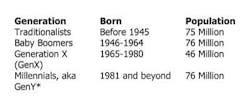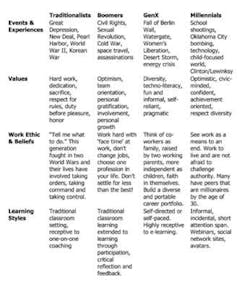Managing and Motivating a Multigenerational Practice
by Fran Pangakis, RDH, and Shari Tastad, RHD, BS
*Generation Z (GenZ) and Nexters are those born after 2000. For the purpose of this article, we will include all these groups in the Millennial category. And we can’t forget “Cuspers," people who were born on the “cusp” of one generation or the other. Cuspers may feel a stronger connection with one generation over another, but often display behaviors of both.
So … what’s a “generational manager” to do?
If we were to sit all four generations around a table and discuss generational issues relating to famous people, historical events, TV/radio shows, inventions, work beliefs — just to name a few — we would undoubtedly end up with very diverse opinions and a very lively discussion! This is not surprising, considering the varying events, experiences, values, work beliefs, and learning styles each generation has grown up with.
GenX: Appreciate feedback that is instant, direct, and regular. They also want to have their good work reinforcedMillennials: Appreciate continual feedback. To them, “no news is bad news,” so they want feedback immediately, whether it’s positive or negative. If, like many dentists, you are a Traditionalist, you will struggle giving instant and continual feedback. Conversely, if you have a younger boss, you may find you get more feedback than you anticipated or needed. While giving or getting feedback may not come naturally to the Traditionalist or Boomer manager, it is essential for you to build on this skill if you intend to minimize turnover in your practice. The crucial issue of “fun at work”Understanding how the generations feel about “fun at work” is also vital to your success. Traditionalists: Not sure you can have fun at work. It’s an end to a means.Boomers: It’s all about a productive day. Compete and win! Invented “Casual Friday."GenX: Fun at work is a social gathering — it’s about being with my co-worker "family."Millennials: Working from home is the best. Constantly evaluate if their job is “fun.” If not, be prepared for them to jump ship. So how do you tackle the question of “fun at work”? A staff retreat that combines work and play is a great way to start, and it's also a team morale-builder. Working together to understand and acknowledge generational differences can propel you forward by leaps and bounds. It gives you the chance to:
- Get to know your employees.
- Find out what motivates them.
- Look at what makes you uncomfortable communicating with them.
- Learn how to broaden your skills.
Look at feedback systems that support all generations, remembering that feedback goes both ways — both up and down — especially with the Xers. One-size-fits-all may not be the best approach in today’s work environment.
Consider these generational “case studies.” What would you do?
Case Study #1: You have two team members, both good workers, who don’t like each other. One is in her late 40s (a Boomer), the other is in her early 20s (a Millennial). Their animosity toward each other causes friction in your office. What do you do?
Case Study #2: To you, punctuality has always been a demonstration of respect within the workplace. But there doesn’t seem to be a person under 30 in your office who shows up consistently on time. What do you do?
Case Study #3: One of your employees is 30 years your junior. She is bright and well-trained, and while she can be warm and friendly, she also possesses a "take-no-prisoners" attitude when addressing certain issues. This has produced considerable friction within the practice, sometimes even with patients. The one time you approached her about this, she said, basically, “They’re wrong, I’m right.” What do you do?
Working effectively with multiple generations is not an option — it's a necessity!
Whether you like it or not, Millennials are the up-and-coming generation at work, and there are a lot of them! Combined, GenX and Millennials outnumber Boomers and Traditionalists, and their effect and influence is not something organizations can afford to avoid or ignore.
Priority number one in every organization should be to help all employees avoid confusing perception with reality. Create opportunities — workshops, informal get-togethers, mentoring — for members of each generation, so that they have the opportunity to share their views and perspectives.
The cost of not doing so can be significant in terms of:
- Turnover rates
- Tangible costs (recruitment, hiring, training, retention)
- Intangible costs (morale)
- Grievances and complaints
- Perceptions of fairness and equality
As an employer, and the leader of your team, do not allow tradition and convenience to trump the opportunity to change and improve productivity. Decide as a group which norms will work best for your multigenerational team, and put those policies and procedures in place now.





